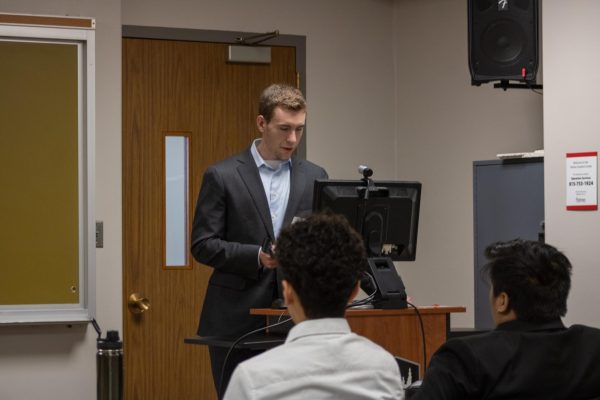Undercover NIU police officers preside over numerous classes
March 2, 2009
You don’t know who they are or where they are. All you know is they’re there.
Armed undercover NIU police officers posing as students: in classes, at sporting venues and at other events on campus. If a time comes when violence is imminent, they are highly trained to react, police officials say.
They are called C.A.M.P.U.S. officers, the acronym standing for Community Assault Mitigation Program for University Systems, and they’ve been in place for a “couple terms now,” said NIU Police Chief Donald Grady.
The program illustrates the length universities will go to in order to protect their students in the wake of a rash of shootings on college campuses, including the Feb. 14 shootings.
“Extreme times require you to implement extreme measures,” Grady said.
In his office in the Telephone and Security Building Friday afternoon, Grady, seated next to Police Operations Director Todd Henert, divulged publicly the most information about the program to date.
He hopes the publicity will deter those looking to commit acts of violence at NIU. Getting the word out about the program is the whole point, he said, as it’s supposed to act as a deterrent rather than solely a response tool. As an example, he cited the Air Marshal program, which is similar to C.A.M.P.U.S. in that undercover agents on planes blend in with passengers, which is considered an impediment to would-be hijackers.
Grady was adamant that no cost is too high to save just one student’s life. He defended the program tooth and nail, railing against those who say the best solution is to arm every student.
Grady stressed that the officers will be trained to deal with high stress, chaotic situations; they’re not going to be rookies. The difference between C.A.M.P.U.S. officers and air marshals is that marshals are in a confined space in airplanes, while C.A.M.P.U.S. officers are in big, open areas with lots of people. The officers will readily identify themselves in the event that they are moved to respond to a given situation.
The undercover officers go to classes and do everything that regular students do: study for tests, participate in classes, do homework. They even pay for their classes, so as not to raise suspicions and to prevent possible hackers from finding out which students aren’t paying.
“I’m making sure they’re in the classrooms learning something,” Grady said. “We leave it up to them to figure out which degree they want to pursue.”
“A very limited number of people” among NIU Police know who the officers are, Grady said, adding that teachers and administrators won’t be among those who know. The officers will have contact with superiors but, “Just because you walk into [the Telephone and Security Building] doesn’t mean you’re a C.A.M.P.U.S. officer,” he said.
Grady praised President John Peters and Eddie Williams, executive vice president and chief of operations of Finance and Facilities, for sparing no expense and being willing to do whatever it takes to keep students safe. The final decision on whether to implement C.A.M.P.U.S. came from “above me,” Grady said.
While the program was discussed before Feb. 14, the shootings expedited its implementation. “We talked about it right around the time of Virginia Tech,” Henert said.
With C.A.M.P.U.S., Grady wants to leave potential shooters doubting themselves, asking, “‘Do I really want to go in there, because there might be someone waiting for you,” he said. “We’re going to limit the amount of time you have to do what you need to do as much as possible.”













